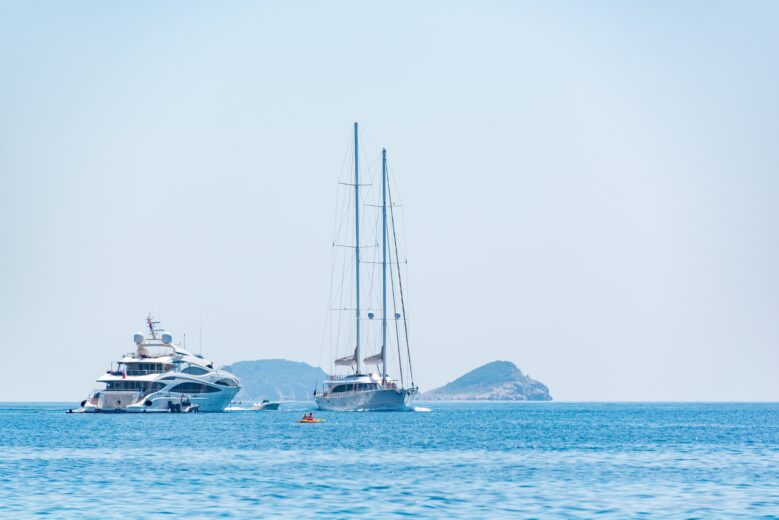Bankers help fuel green revolution

Sustainability is one of the key issues facing the superyacht industry. Photo credit: Monaco Yacht Show.
Global warming is a hot topic. And a quick straw poll across superyacht sectors tells you sustainability remains at the forefront of many people’s thinking in the industry.
A year of unprecedented global temperatures, and new research which suggests the planet is warming faster than previously thought, may have permanently pinned the reduction of carbon emissions to the top of the to-do list.
Sign up for the Superyacht Investor newsletter
Some scientists now think temperatures could rise higher than 1.5 C above pre-industrial levels – a key threshold agreed by global leaders in Paris in 2015 – by 2029 instead of in the mid 2030s. The study, led by climate scientists at Imperial College London, was published in the journal Nature Climate Change on 30 October.
But while superyachts are a small part of the overall picture – responsible for 0.4% of greenhouse gas emissions from shipping, which is 4% of total GHG emissions, according to the non-profit environmental group SEA Index in Monaco – they support a significant industry. And like tributaries trickling towards the main river, each branch of the industry can contribute to a greener future.
Incentives
For the bankers there is the twin aspiration of saving the planet and safeguarding their loan.
“The environmental footprint of the yachts we finance has become very important and I can say we put environmental requirements at the same level on the compliance profile as the owner,” says Olivier Blanchet, head of jet and yacht finance, BNP Paribas.
READ: Charters resist headwinds, buyers in charge, new horizons beckon
The bank, which is a member of the UN-convened Net Zero Banking Alliance (NZBA), is looking to reduce the carbon emissions of its superyacht financing portfolio by 80% by 2050, according to Blanchet. He says it is key not just for the environment, adding that his bank can “refuse to finance a yacht” if environmental requirements are not met, but because outdated eco- credentials will have a “negative influence on yacht value, irrespective of macro-economic issues like war in Ukraine or the Middle East”.
“We promote and try to make some incentives for the latest productions, and we try to support the building process of yachts who benefit from the latest technology, for example fuel cell or methanol production,” he adds.

The superyacht industry has a part to play in reducing global warming. Photo: Monaco Yacht Show.
Social pressure
Sam Cook, head of speciality lending for EMEA, JP Morgan says his business is ultimately driven by clients but says “over time” there is likely to be a “focus on supporting green loans”.
He adds that many of his clients are anyway working with shipyards to build new, larger yachts with the latest technology and innovative solutions that will benefit the overall industry over time.
“We’re not limiting the business we do because of where we’re focused in the market,” he says, adding they will “help facilitate” clients looking at older pre-owned yachts “within reasonable boundaries”.
“We’re encouraging, but not necessarily contractually requiring, clients to think about more green initiatives, not only in terms of propulsion systems but also how they operate and manage their yachts.”
READ: Why amped-up asking prices lead to ‘frustration’ and ‘stagnation’
READ: Sales fizz subsides as market divides
Sustainable yacht management is a key piece of the puzzle, agrees Blanchet. “For us it’s very important to make sure a vessel runs with a much more environmentally friendly footprint,” he says, adding that a “strict environmental management plan” is crucial when it comes to re-sale.
Both Blanchet and Cook agree that the shipyards, especially those in northern Europe, are pioneering sustainability in yachting in line with wider initiatives around the production and distribution of green fuel.
The drivers are the need to future-proof the business in the face of competition from other yards and social pressure from forward-thinking owners, the public and activists, says Giedo Loeff, head of R&D, Feadship, which aims to build a carbon-neutral superyacht by 2030.
“Social pressure is also me and my colleagues – do you want to work for a company that is building superyachts?” he adds. “If Feadship didn’t drive this I’m not sure I’d want to work here anymore so there’s lots of social pressure and I think that’s really strong at the end of the day.”

Innovation in the superyacht industry can help fuel the green revolution. Photo: Diego F. Parrar.
‘Gatekeepers of biodiversity’
The journey to a greener future is “market-driven” rather than “finance-driven”, says Cook, but one issue it seems the industry is facing is unifying all the engaged eco players and projecting the sustainability message to the world.
“There are some very good initiatives, with Water Revolution Foundation, with Sea Index and various other organisations but there is a lack of coordination and communication,” says Blanchet.
Natalie Quevert of SEA Index, which has developed a tool for assessing the environmental impact of yachts, called for an energy efficiency rating to be applied across all yachts so owners know what they are buying.
“We’re a niche industry, people tend to forget that, so we need more transparency for the planet and for consumers,” she says.
Transparency and communication would help to change the “negative image” of superyachts in the public eye, according to Blanchet.
“Wealthy people have a bigger responsibility to be the gatekeepers of the biodiversity of the ocean, to create positive added value when they use their yachts, to collect data or use the yacht as a platform for artists or philanthropy or social action to change the image of the superyacht in the public opinion,” he says.
“I tend to believe if this industry wants to survive it has to take care of this social issue because the new generations don’t want to be seen as the ones who pollute the oceans.”
Subscribe to our free newsletter
For more opinions from Superyacht Investor, subscribe to our email newsletter.


